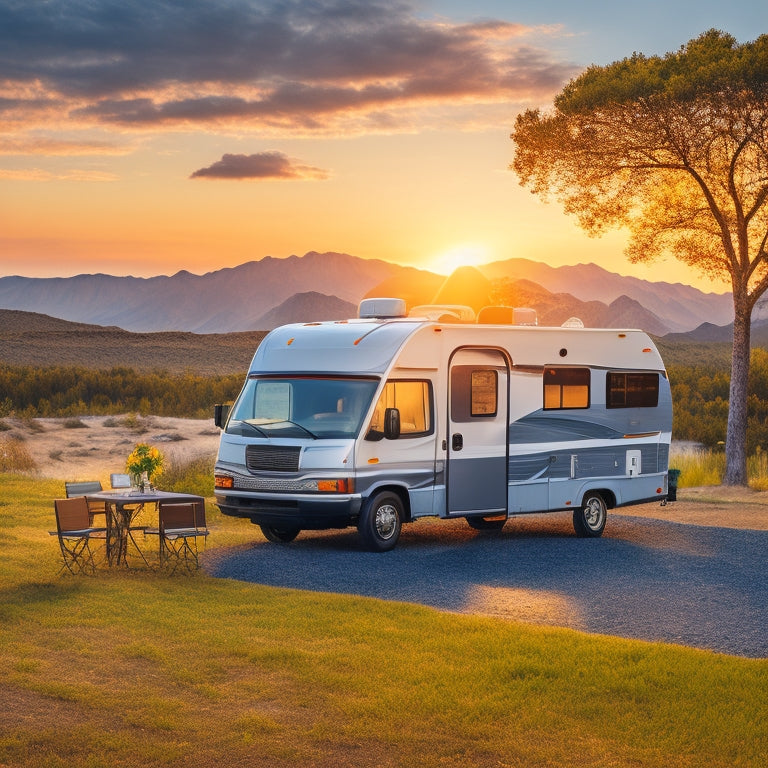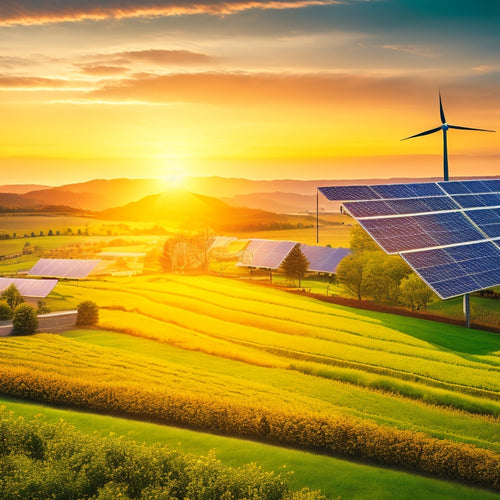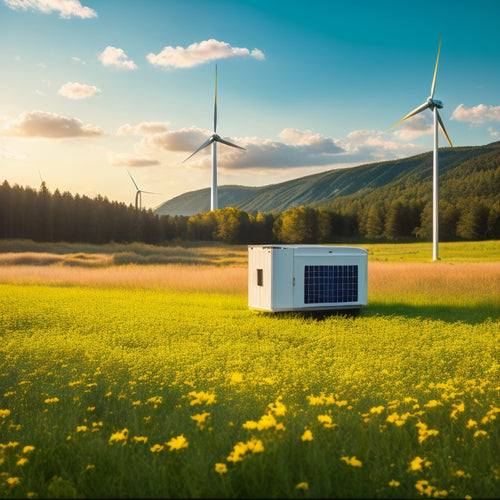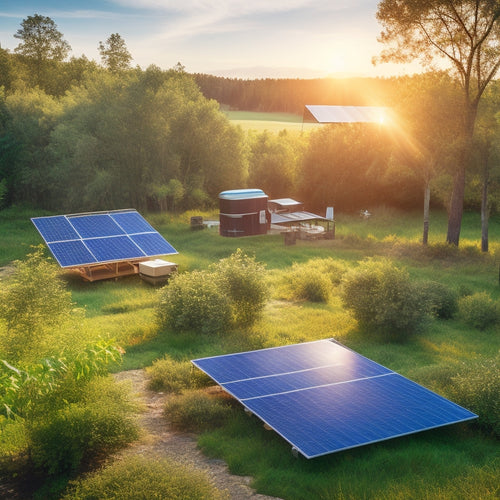
7 Essential Energy Upgrades for RV Owners
Share
You're looking to upgrade your RV's energy system, and you're in the right place! You'll want to start with solar panels, tailored to your roof's specifications, and pair them with high-capacity batteries for enhanced energy independence. Next, consider an efficient inverter system for seamless off-grid use. Don't forget energy-efficient lighting, a portable power station, and wind turbine integration for a sustainable adventure. Finally, advanced charge controllers will optimize your energy consumption. By incorporating these 7 essential upgrades, you'll be well on your way to a self-sustaining RV experience - and we're just getting started.
Key Takeaways
• Integrate solar power systems to harness renewable energy and reduce reliance on traditional fuel sources.
• Upgrade to high-efficiency batteries and inverters to optimize energy storage and conversion.
• Implement energy-efficient lighting solutions, such as LED retrofitting, to minimize energy consumption.
• Invest in advanced charge controllers and monitoring systems to optimize energy generation and consumption.
• Regularly inspect and maintain energy systems to ensure optimal performance and extend system lifespan.
Solar Panels for RV Roofs
Installing solar panels on your RV's roof is a great way to harness the sun's energy and reduce your reliance on noisy generators and expensive fuel. When thinking about solar panels, you'll want to make sure your RV's roof can handle the added weight and stress.
Roof durability is vital, so it's important to examine your roof for any signs of wear or damage before installation. A sturdy roof will provide a solid foundation for your solar panels, ensuring a safe and efficient energy harvest.
When it comes to panel angles, you'll want to think about the best position for maximum energy absorption. A tilted angle of around 30-40 degrees is ideal, allowing you to capture the most sunlight throughout the day. However, you may need to adjust the angle depending on your RV's roof design and the time of year.
High-Capacity Battery Upgrades
Upgrading to high-capacity batteries is an essential step in maximizing your RV's energy independence, as they provide the storage capacity you need to harness the power generated by your solar panels.
With high-capacity batteries, you can store excess energy generated during the day for use at night or on cloudy days. This means you can enjoy the freedom to boondock or camp off-grid for extended periods.
When selecting high-capacity batteries, consider those with advanced features that monitor and maintain the best battery health. Look for batteries with built-in monitoring systems that track charging cycles, voltage, and temperature to keep your batteries last as long as possible.
By choosing the right high-capacity batteries, you'll be able to store more energy, reduce your reliance on generators, and enjoy a more sustainable RVing experience.
Inverter Systems for Off-Grid
As you prepare for your next off-grid adventure, you're probably wondering how to keep your RV's systems running smoothly without relying on public hookups. That's where inverter systems come in - they're the key to converting your stored DC power into usable AC energy.
Powering Off-Grid Adventures
You'll need a reliable inverter system to power your off-grid adventures, especially when venturing into remote areas with limited access to traditional power sources. As an RV owner embracing off-grid lifestyles, you understand the importance of wilderness survival. A high-quality inverter system is vital for powering your essential appliances, such as lights, laptops, and refrigerators, while living off the grid.
When selecting an inverter system, consider the following key factors:
-
Power output: Choose an inverter that can handle your total power requirements, including surge capacity for appliances like air conditioners.
-
Efficiency: Opt for an inverter with high efficiency ratings to minimize energy losses and reduce your energy consumption.
-
Reliability: Look for inverters with a proven track record of reliability, durability, and low maintenance needs.
- Compatibility: Make sure the inverter is compatible with your RV's electrical system and can integrate with your existing battery setup.
Efficient Energy Conversion
When it comes to efficient energy conversion, your inverter system's ability to convert DC power from your batteries to AC power for your appliances is crucial, and a high-efficiency inverter can greatly reduce energy losses and prolong your off-grid adventures. As you prepare for your next adventure, it's important to evaluate your energy needs and optimize your conversion system.
Conducting an energy audit will help you identify areas of inefficiency and pinpoint opportunities for improvement. By upgrading to a high-efficiency inverter, you'll be able to maximize your energy output while minimizing losses. This means you'll be able to power your appliances for longer periods, giving you more freedom to explore off-grid.
Look for inverter systems with high conversion rates, low standby power consumption, and advanced features like multi-stage charging and automatic generator start. By investing in an efficient conversion system, you'll be able to enjoy the freedom and flexibility that comes with off-grid adventures, while also reducing your environmental impact.
Silent Operation Benefits
By optimizing your energy conversion system, you're not only saving energy but also creating a more comfortable living space, and one of the most significant benefits of advanced inverter systems is their silent operation. This means you can enjoy peaceful camping experiences without the constant hum of a generator in the background.
Silent operation benefits extend beyond just comfort, though - it also means you can camp in noise-restricted areas or during quiet hours without worrying about disturbing others.
Here are some key advantages of silent operation:
-
Noise reduction: Advanced inverter systems minimize noise pollution, making them perfect for camping in noise-sensitive areas or during quiet hours.
-
Peaceful camping: Silent operation means you can focus on the sounds of nature, not the hum of a generator, creating a more immersive camping experience.
-
Increased flexibility: With silent operation, you can camp in more locations, including those with noise restrictions, without worrying about disturbing others.
- Improved overall experience: By reducing noise pollution, you can better connect with nature and enjoy a more relaxing camping experience.
Energy-Efficient Lighting Solutions
Replacing traditional incandescent bulbs with energy-efficient LED or fluorescent alternatives can greatly reduce your RV's energy consumption. By making this simple shift, you'll not only prolong the life of your batteries but also reduce the strain on your electrical system.
LED retrofitting is a fantastic way to upgrade your RV's lighting, providing a seamless shift to energy-efficient lighting. You can replace existing fixtures with LED equivalents, ensuring a consistent look and feel while enjoying significant energy savings.
For added convenience, consider installing dimmable fixtures. These allow you to adjust the brightness to your liking, creating a more comfortable and inviting atmosphere within your RV. Dimmable LED lights can be adjusted to provide the perfect amount of light for reading, cooking, or relaxing, all while minimizing energy consumption.
Portable Power Station Options
You can take your energy independence to the next level with portable power stations, which offer a convenient and flexible way to keep your devices charged and your RV's systems running smoothly. These compact powerhouses are designed to provide reliable energy on-the-go, and they're perfect for RV owners who want to stay off-grid for extended periods.
When choosing a portable power station, consider the following key factors:
-
Power Output: Look for a station with a high power output to make sure you can power multiple devices simultaneously.
-
Battery Life: Opt for a station with a long-lasting battery that can keep your devices charged for hours or even days.
-
Portability: Consider the weight, size, and handle design to make sure the station is easy to carry and store in your RV.
- Expandability: Choose a station with expansion options, such as additional battery packs or solar panels, to increase your energy capacity as needed.
Wind Turbine Integration Systems
When considering a wind turbine integration system for your RV, you'll need to think about the turbine's size and placement, as well as its energy generation capacity.
You'll want to choose a system that can meet your energy needs, whether that's powering your appliances or keeping your batteries charged.
Turbine Size and Placement
Sizing your turbine correctly and placing it in the right spot is crucial, as even a slight miscalculation can greatly impact your energy output. You want to maximize your energy generation while minimizing any potential drawbacks.
When it comes to turbine size and placement, consider the following key factors:
-
Turbine Height: Installing your turbine at a higher height can increase energy output by capturing stronger, more consistent winds. However, this may also increase noise levels and visual impact.
-
Noise Reduction: If you plan to park your RV in residential areas or noise-sensitive environments, consider a turbine with built-in noise reduction features or opt for a quieter model.
-
Obstruction Avoidance: Make sure your turbine is placed at least 10 feet away from any obstacles, such as trees, buildings, or other RVs, to minimize turbulence and optimize energy generation.
- Directional Orientation: Face your turbine in the direction that captures the most consistent wind patterns to maximize energy output.
Energy Generation Capacity
Your wind turbine's energy generation capacity depends on the integration system's ability to efficiently convert mechanical energy into electrical energy, and selecting the right system is essential to maximizing your RV's power output.
You'll want to ponder an integration system that can handle the fluctuations in wind speed and direction, ensuring a stable and consistent energy supply. A high-quality integration system will also enable you to store excess energy in your energy storage system, allowing you to tap into it when the wind dies down.
Moreover, look for a system that offers grid connectivity, enabling you to sell excess energy back to the grid and offset your energy costs. By choosing the right integration system, you'll be able to harness the full potential of your wind turbine, ensuring a reliable and efficient energy supply for your RV.
With the right system in place, you'll be able to enjoy the freedom and independence that comes with generating your own clean energy on the go.
Installation and Maintenance
Properly installing and maintaining your wind turbine integration system is crucial to guaranteeing peak energy generation and minimizing downtime, so take the time to research and follow the manufacturer's instructions. You'll be glad you did, as a well-maintained system will provide you with a dependable source of energy on the go.
To guarantee peak performance, make sure to:
-
Schedule Regular Inspections: Regularly inspect your system to identify potential issues before they become major problems.
-
Monitor Performance: Keep an eye on your system's performance, and address any deviations from normal operating conditions.
-
Perform Fault Diagnosis: Quickly identify and diagnose faults to minimize downtime and get your system back online fast.
- Update Software and Firmware: Stay up-to-date with the latest software and firmware updates to ensure your system is running efficiently and effectively.
Advanced Charge Controller Systems
When upgrading your RV's electrical system, incorporating an advanced charge controller can make a significant difference in your overall energy efficiency and battery life. These systems don't just regulate power flow; they're designed to optimize energy harvesting, reduce waste, and provide real-time monitoring.
With advanced charge controllers, you'll enjoy improved grid resilience, ensuring your RV's electrical system can withstand fluctuations in power supply.
Smart monitoring capabilities allow you to track your energy usage, identify areas for improvement, and receive alerts when maintenance is required. This level of insight enables you to make data-driven decisions, optimizing your energy consumption and extending the lifespan of your batteries.
Advanced charge controllers can also detect potential issues before they become major problems, reducing the risk of downtime and costly repairs. By integrating an advanced charge controller into your RV's electrical system, you'll experience enhanced energy efficiency, reduced maintenance, and a more reliable power supply – giving you the freedom to adventure with confidence.
Frequently Asked Questions
Can I Install Energy Upgrades Myself or Do I Need a Professional?
"Think you're a DIY master? Hold that thought! Unless you've got the Professional certification to back it up, you'll likely end up with a hot mess on your hands - so, be honest about your DIY confidence."
How Do I Determine My Rv's Specific Energy Needs and Requirements?
"To determine your RV's specific energy needs, start by conducting an energy audit to identify power-hungry appliances, then perform a load calculation and wattage monitoring to pinpoint exact energy requirements, and finally, create a power profiling report to optimize energy usage."
Are Energy Upgrades Compatible With My Rv's Existing Electrical System?
'Like a puzzle piece, your energy upgrades need to fit seamlessly with your RV's existing electrical system. You'll want to guarantee system integration is smooth, and your electrical capacity can handle the added power, so you don't overload and short-circuit your system.'
Can I Customize Energy Upgrades to Fit My Specific Travel Style?
You can tailor energy upgrades to fit your travel priorities by exploring personalization options that cater to your unique needs, ensuring your RV's energy system aligns with your adventurous lifestyle.
Are Energy Upgrades Worth the Investment for Occasional RV Use?
"When considering energy upgrades for occasional RV use, you'll want to weigh the cost-benefit ratio. Since you won't be using your RV frequently, prioritize energy-efficient solutions that offer the most bang for your buck, aligning with your infrequent usage and energy priorities."
Related Posts
-

Net Metering in Renewable Energy's Future
Net metering's future is vital for driving renewable energy growth and financial savings. You can reduce your electri...
-

Sustainable and Eco-Friendly Generators for a Reduced Carbon Footprint
Sustainable and eco-friendly generators are perfect for cutting your carbon footprint and increasing energy efficienc...
-

Top Off Grid Solar Batteries for Renewable Energy
When seeking top off-grid solar batteries for renewable energy, consider options with advanced battery chemistry, suc...


